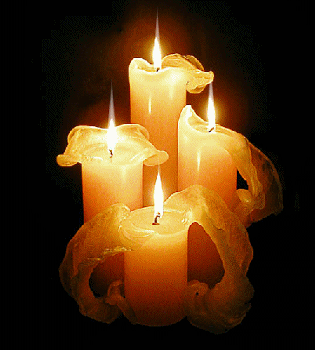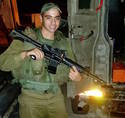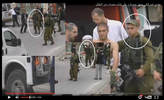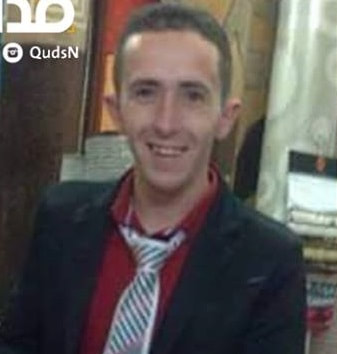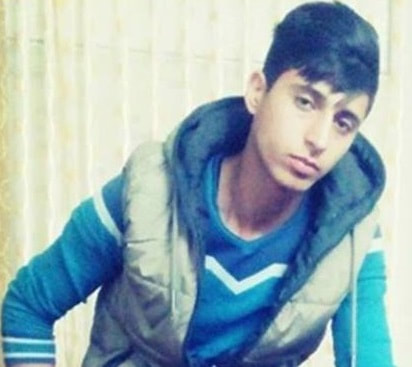27 july 2016
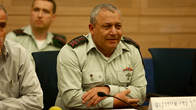
Chief of Staff Gadi Eisenkot at FASC meeting
During closed Foreign Affairs and Security Committee meeting, Gadi Eisenkot warns that witnesses in IDF cases such as Sgt. Elor Azaria affair must be able to testify without fear of political smear campaigns. 'These politicians have agendas.'
IDF Chief of Staff Gadi Eisenkot stated Tuesday that certain statements made by politicians and civil servants against the IDF threatened a loss of public faith in the IDF.
The comments came during a closed meeting on Tuesday night with the Foreign Affairs and Security Committee (FASC) during which he expressed his belief that the ad hominem attacks represented the greatest threat to the military.
“The statements that have been made recently on operational matters which are still being checked by the military command and judicial system are not appropriate and they don’t influence the internal procedures in the IDF,” he said.
The main example which Eisenkot cited was the ongoing case of Sgt. Elor Azaria who shot dead an immobilized terrorist, Abed al Fatah Al-Sharif, in March in Hebron.
“Many things have been said without knowledge of the facts, in order to advance agendas unconnected with the IDF. We want the IDF to operate according to orders, rules of engagement for opening fire and according to the spirit of IDF values. If someone wants a gang ethos, speak now,” he said.
The chief of staff then condemned the attacks levelled by some politicians against the Azaria trial. “All the procedures were undertaken according to orders. The commanders recognized that this was an unusual case before the video even reach the media,” he insisted.
“The process is fair but it can’t be that from the very first moments there is slander and defamation against soldiers and commanders in the army. These people are doing what they do with agendas in mind. There is no basis to the accusations against the judicial procedures,” Eisenkot continued. “There are clear values in the IDF and I am conscious of them especially when it comes to opening fire. If we don’t keep them in mind then the IDF is the one that will be hurt,” he continued.
Eisenkot then said that military judicial proceedings must be allowed to occur without the harassment of key witnesses: “The military proceedings must be able to function according to accepted norms and without external interference. Witnesses called by the prosecution and by the defense must be able to say the truth without fear of worry. Every attempt to exert pressure on those involved in the judicial process deserve to be condemned,” he said.
An MK asked Eisenkot if he could be specific on which politicians were slandering the IDF to which he quipped that he should look on up on Google.
Following the chief of staff’s comments Chairman of the FASC, MK Avi Dichter decided to bring a vote before the committee on whether to issue a statement of support for Eisenkot and IDF commanders and pledge to protect the IDF from political controversies.
Eisenkot then touched on another IDF case involving Brig. Gen. Ofek Buchris who was indicted last week for a series of sexual assault and rape allegations levelled by a female soldier and a female officer under his command. Eisenkot dismissed the accusation voiced since the beginning of the case suggesting that the investigation against Buchris was merely a smear campaign to prevent his progress in the army.
“Statements implying that they are stopping the progression of an officer in a specific sector have no connection with reality,” he said before emphasizing that his obligations to a highly decorated officer such as Buchris were no more or less than those to a soldier or officer that may have been harmed.
Finally, he addressed the comments recently made by his nominee for the position of of IDF chief rabbi, Rabbi Col. Eyal Karim who made controversial statements regarding women, gay people. According to Eisenkot, the matter was checked and he had personally expressed his dissatisfaction directly to Karim for his comments and decided to stick with his nomination after he apologized.
On the disparaging remarks about gay people made by Rabbi Yigal Levinstein, who heads an IDF preparatory yeshiva however, Eisenkot categorically condemned him and stated his intentions to bring a halt to all his activities in the IDF until a final decision was made on how to proceed by the chief of staff of the defense ministry, Maj. Gen. Udi Adam.
During closed Foreign Affairs and Security Committee meeting, Gadi Eisenkot warns that witnesses in IDF cases such as Sgt. Elor Azaria affair must be able to testify without fear of political smear campaigns. 'These politicians have agendas.'
IDF Chief of Staff Gadi Eisenkot stated Tuesday that certain statements made by politicians and civil servants against the IDF threatened a loss of public faith in the IDF.
The comments came during a closed meeting on Tuesday night with the Foreign Affairs and Security Committee (FASC) during which he expressed his belief that the ad hominem attacks represented the greatest threat to the military.
“The statements that have been made recently on operational matters which are still being checked by the military command and judicial system are not appropriate and they don’t influence the internal procedures in the IDF,” he said.
The main example which Eisenkot cited was the ongoing case of Sgt. Elor Azaria who shot dead an immobilized terrorist, Abed al Fatah Al-Sharif, in March in Hebron.
“Many things have been said without knowledge of the facts, in order to advance agendas unconnected with the IDF. We want the IDF to operate according to orders, rules of engagement for opening fire and according to the spirit of IDF values. If someone wants a gang ethos, speak now,” he said.
The chief of staff then condemned the attacks levelled by some politicians against the Azaria trial. “All the procedures were undertaken according to orders. The commanders recognized that this was an unusual case before the video even reach the media,” he insisted.
“The process is fair but it can’t be that from the very first moments there is slander and defamation against soldiers and commanders in the army. These people are doing what they do with agendas in mind. There is no basis to the accusations against the judicial procedures,” Eisenkot continued. “There are clear values in the IDF and I am conscious of them especially when it comes to opening fire. If we don’t keep them in mind then the IDF is the one that will be hurt,” he continued.
Eisenkot then said that military judicial proceedings must be allowed to occur without the harassment of key witnesses: “The military proceedings must be able to function according to accepted norms and without external interference. Witnesses called by the prosecution and by the defense must be able to say the truth without fear of worry. Every attempt to exert pressure on those involved in the judicial process deserve to be condemned,” he said.
An MK asked Eisenkot if he could be specific on which politicians were slandering the IDF to which he quipped that he should look on up on Google.
Following the chief of staff’s comments Chairman of the FASC, MK Avi Dichter decided to bring a vote before the committee on whether to issue a statement of support for Eisenkot and IDF commanders and pledge to protect the IDF from political controversies.
Eisenkot then touched on another IDF case involving Brig. Gen. Ofek Buchris who was indicted last week for a series of sexual assault and rape allegations levelled by a female soldier and a female officer under his command. Eisenkot dismissed the accusation voiced since the beginning of the case suggesting that the investigation against Buchris was merely a smear campaign to prevent his progress in the army.
“Statements implying that they are stopping the progression of an officer in a specific sector have no connection with reality,” he said before emphasizing that his obligations to a highly decorated officer such as Buchris were no more or less than those to a soldier or officer that may have been harmed.
Finally, he addressed the comments recently made by his nominee for the position of of IDF chief rabbi, Rabbi Col. Eyal Karim who made controversial statements regarding women, gay people. According to Eisenkot, the matter was checked and he had personally expressed his dissatisfaction directly to Karim for his comments and decided to stick with his nomination after he apologized.
On the disparaging remarks about gay people made by Rabbi Yigal Levinstein, who heads an IDF preparatory yeshiva however, Eisenkot categorically condemned him and stated his intentions to bring a halt to all his activities in the IDF until a final decision was made on how to proceed by the chief of staff of the defense ministry, Maj. Gen. Udi Adam.
26 july 2016
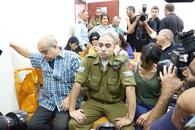
In the Hebron soldier's final day of testimony, the panel of judges addressed their questions to him, attempting to ascertain when he felt that he was at risk, and why he acted as he did when he did.
After the conclusion of the accused's cross examination on Tuesday by the military prosecutor, later that evening the panel of judges questioned defendant Sgt. Elor Azaria, who is on trial for manslaughter after having shot dead an immobilized terrorist, Abed al Fatah Al-Sharif, in March in Hebron.
Judge Lt. Col. Carmel Vahavi asked Azaria to explain why he didn't shot al-Sharif earlier if, as Azaria had alleged, al-Sharif posed a danger to the persons in the area. "I don't know why I didn't shoot earlier," replied the defendant, who shortly after finished his 23 hours of testifying, which had been spread out over three days.
"My son is a hero," said Charlie Azaria at the session's conclusion, thanking the Israeli nation for their support. The trial is recessed for 2.5 weeks, when the defense will resume presenting its witnesses, which include two combat brigadier generals in reserves and two reserve major generals.
The military prosecutor, Lt. Col. (res.) Nadav Weisman, said, "Over the past three days, we have seen Azaria not manage to give explanations for variations in his versions and why others are allegedly falsely accusing him and contradicting his version."
During Azaria's testimony, Vahavi asked, "The data that led you to shoot were in your mind earlier: the warning of a combined attack, the Adloyada (Purim parade) that same day, the warm clothing, the shouting 'He's booby-trapped,' the attack itself, the knife next to the terrorist, and the knowledge about the statement that the terrorist moved. You knew all this at an earlier stage. Why didn't you shoot earlier?
Azaria: "As soon as I understood that the danger was immediate and real, I acted."
Vahavi: "The prosecutor claims that the time between these data and the shooting was two minutes, not fractions of a second. That's not an insignificant amount of time."
Azaria: "I acted when I understood the danger."
Vahavi: "How did you feel immediately following the shooting?"
After the conclusion of the accused's cross examination on Tuesday by the military prosecutor, later that evening the panel of judges questioned defendant Sgt. Elor Azaria, who is on trial for manslaughter after having shot dead an immobilized terrorist, Abed al Fatah Al-Sharif, in March in Hebron.
Judge Lt. Col. Carmel Vahavi asked Azaria to explain why he didn't shot al-Sharif earlier if, as Azaria had alleged, al-Sharif posed a danger to the persons in the area. "I don't know why I didn't shoot earlier," replied the defendant, who shortly after finished his 23 hours of testifying, which had been spread out over three days.
"My son is a hero," said Charlie Azaria at the session's conclusion, thanking the Israeli nation for their support. The trial is recessed for 2.5 weeks, when the defense will resume presenting its witnesses, which include two combat brigadier generals in reserves and two reserve major generals.
The military prosecutor, Lt. Col. (res.) Nadav Weisman, said, "Over the past three days, we have seen Azaria not manage to give explanations for variations in his versions and why others are allegedly falsely accusing him and contradicting his version."
During Azaria's testimony, Vahavi asked, "The data that led you to shoot were in your mind earlier: the warning of a combined attack, the Adloyada (Purim parade) that same day, the warm clothing, the shouting 'He's booby-trapped,' the attack itself, the knife next to the terrorist, and the knowledge about the statement that the terrorist moved. You knew all this at an earlier stage. Why didn't you shoot earlier?
Azaria: "As soon as I understood that the danger was immediate and real, I acted."
Vahavi: "The prosecutor claims that the time between these data and the shooting was two minutes, not fractions of a second. That's not an insignificant amount of time."
Azaria: "I acted when I understood the danger."
Vahavi: "How did you feel immediately following the shooting?"
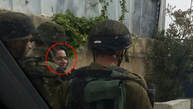
Azaria after the shooting
Azaria: "In shock, a storm of emotions."
Vahavi confronted Azaria with the footage that had been shown: "What bothers me is your position during your entire testimony regarding the video. The videos were submitted as evidence. You rejected the videos in your testimony."
Azaria replied, "The videos didn't reveal anything. There's no weather in the video. In reality, it's like a war."
Later, Azaria stated, "A moment before the shooting, I had a dilemma that if I shoot, I would apparently take a life from a terrorist, a person, to neutralize and to save life."
Judge Lt. Col. Yaron Sitvon wondered about Azaria's refusal to reconstruct the incident as a tool that could have helped the judges to better understand what happened. Azaria answered that he agreed to the conditions presented by the lawyers.
Earlier in the night, addressing Judge Col. Maya Heller, Azaria said, "In the field, when the company commander came up to me, what was in my head was to tell him that there was an immediate fear of an explosive and knife."
Heller: "Why didn't you say to the company commander something simple, like 'I saved you' and read him the rules of engagement?"
Azaria: "I was in shock and a storm of emotions."
Heller: "What you wanted to happen, for the most justified reason, indeed happened. So why was your immediate reaction shock and confusion?"
Azaria: "It was my first incident with massive bleeding and the fact that I had shot for the first time at a terrorist, a person."
Addressing Azaria's claim that the battalion commander, Lt. Col. David Shapira, had lied to the court, Heller asked, "Why would the battalion commander need to cover himself, as you alleged?"
Azaria replied, "The battalion commander also understood his mistake with me, and he needs to get a position at the Officers' Training School. The mistake is how he didn't respond in the field in a conversation with me."
Sgt. Elor Azaria grilled in court for third day
Chief prosecutor engages in a back and forth with Azaria in effort to establish the time it took for him to decide to shoot the terrorist; Azaria: 'You are trying to catch me with words. I didn't have a timer.'
The cross examination of Sgt. Elor Azaria continued into its third and final day on Tuesday morning after two days of intense questioning by prosecutor Lt. Col. Nadav Weisman about the circumstances under which he shot dead a wounded terrorist in Hebron last March.
During the hearing in the special military court in Jaffa, Azaria denied that feelings of revenge had been the motivating factor in pulling the trigger. “If it was revenge I would have got closer and shot one bullet in his head,” he said before attacking once again his commanders who have testified against him. “The company commander Lt. Col. David Shapira lied to the court,” the court heard two days after he accused them of “throwing me to the dogs.”
When he was asked why, in his opinion, Shapira would have lied, Azaria answered: “He is scared of what the world will say and because he is about to start a new job.”
At the beginning of the hearing, the prosecutor played the video produced by the Division of Identification and Forensic Science (DIFS) which combined with the original video of the incident filmed by B’Tselem with that filmed by the ambulance driver Ofer Ohana.
Concealing any signs of emotion, Azaria watched over and over the video showing him shooting the terrorist: “I was loaded. I had a helmet in my hand and gave it to my friend in an instinctive reaction. The rest of my actions were automatic according to how I was trained.”
Prosecutor Weisman: “In the video we see you act slowly without expressions of concern.”
Azaria: “That is your opinion. You weren’t in the field. If I had shot for my own personal reasons I would have shot him point blank in the head.”
Responding to Weisman’s question Azaria said he shot the terrorist not only because he heard people shouting, ‘He has a bomb on him’, but because the terrorist made him suspicious. “There were other reasons,” he said. “I didn’t know then who had shouted. Today I know that Ofer Ohana shouted.”
Weisman pressed Azaria by pointing out that two minutes had passed between the shouting about the bomb and the shooting itself, which contradicted the testimony offered by Azaria who claimed a mere seconds passed.
Azaria: “Once again you are catching me with words. When I say a fraction of a second I mean a moment. I didn’t stand there with a timer in the field.”
Prosecutor: “You preached to me yesterday that in the field decisions are made within seconds. Today you confirmed for me that the decision to shoot was taken in a second or in seconds. According to the objective findings you decided to shoot the terrorist two minutes before you shot.”
Azaria: “These are your insights. I didn’t decide that I will go an shoot the terrorist two minutes before the shooting. The videos, taken together, don’t show anything.”
Prosecutor: When did you decide to shoot the terrorist? A second before, 10 seconds before, two minutes before?
Azaria: The moment I realized that there was a clear and present danger. It doesn't work in the field the same way it works here. I can't answer if it was a second or a few seconds before. For example, lets say I hit someone. Ask him when he felt like he was in any danger of getting hit. He won't know how to answer.
Prosecutor: That answer isn't good enough. The burden of blame is upon you. You shot the terrorist.
Azaria: "In shock, a storm of emotions."
Vahavi confronted Azaria with the footage that had been shown: "What bothers me is your position during your entire testimony regarding the video. The videos were submitted as evidence. You rejected the videos in your testimony."
Azaria replied, "The videos didn't reveal anything. There's no weather in the video. In reality, it's like a war."
Later, Azaria stated, "A moment before the shooting, I had a dilemma that if I shoot, I would apparently take a life from a terrorist, a person, to neutralize and to save life."
Judge Lt. Col. Yaron Sitvon wondered about Azaria's refusal to reconstruct the incident as a tool that could have helped the judges to better understand what happened. Azaria answered that he agreed to the conditions presented by the lawyers.
Earlier in the night, addressing Judge Col. Maya Heller, Azaria said, "In the field, when the company commander came up to me, what was in my head was to tell him that there was an immediate fear of an explosive and knife."
Heller: "Why didn't you say to the company commander something simple, like 'I saved you' and read him the rules of engagement?"
Azaria: "I was in shock and a storm of emotions."
Heller: "What you wanted to happen, for the most justified reason, indeed happened. So why was your immediate reaction shock and confusion?"
Azaria: "It was my first incident with massive bleeding and the fact that I had shot for the first time at a terrorist, a person."
Addressing Azaria's claim that the battalion commander, Lt. Col. David Shapira, had lied to the court, Heller asked, "Why would the battalion commander need to cover himself, as you alleged?"
Azaria replied, "The battalion commander also understood his mistake with me, and he needs to get a position at the Officers' Training School. The mistake is how he didn't respond in the field in a conversation with me."
Sgt. Elor Azaria grilled in court for third day
Chief prosecutor engages in a back and forth with Azaria in effort to establish the time it took for him to decide to shoot the terrorist; Azaria: 'You are trying to catch me with words. I didn't have a timer.'
The cross examination of Sgt. Elor Azaria continued into its third and final day on Tuesday morning after two days of intense questioning by prosecutor Lt. Col. Nadav Weisman about the circumstances under which he shot dead a wounded terrorist in Hebron last March.
During the hearing in the special military court in Jaffa, Azaria denied that feelings of revenge had been the motivating factor in pulling the trigger. “If it was revenge I would have got closer and shot one bullet in his head,” he said before attacking once again his commanders who have testified against him. “The company commander Lt. Col. David Shapira lied to the court,” the court heard two days after he accused them of “throwing me to the dogs.”
When he was asked why, in his opinion, Shapira would have lied, Azaria answered: “He is scared of what the world will say and because he is about to start a new job.”
At the beginning of the hearing, the prosecutor played the video produced by the Division of Identification and Forensic Science (DIFS) which combined with the original video of the incident filmed by B’Tselem with that filmed by the ambulance driver Ofer Ohana.
Concealing any signs of emotion, Azaria watched over and over the video showing him shooting the terrorist: “I was loaded. I had a helmet in my hand and gave it to my friend in an instinctive reaction. The rest of my actions were automatic according to how I was trained.”
Prosecutor Weisman: “In the video we see you act slowly without expressions of concern.”
Azaria: “That is your opinion. You weren’t in the field. If I had shot for my own personal reasons I would have shot him point blank in the head.”
Responding to Weisman’s question Azaria said he shot the terrorist not only because he heard people shouting, ‘He has a bomb on him’, but because the terrorist made him suspicious. “There were other reasons,” he said. “I didn’t know then who had shouted. Today I know that Ofer Ohana shouted.”
Weisman pressed Azaria by pointing out that two minutes had passed between the shouting about the bomb and the shooting itself, which contradicted the testimony offered by Azaria who claimed a mere seconds passed.
Azaria: “Once again you are catching me with words. When I say a fraction of a second I mean a moment. I didn’t stand there with a timer in the field.”
Prosecutor: “You preached to me yesterday that in the field decisions are made within seconds. Today you confirmed for me that the decision to shoot was taken in a second or in seconds. According to the objective findings you decided to shoot the terrorist two minutes before you shot.”
Azaria: “These are your insights. I didn’t decide that I will go an shoot the terrorist two minutes before the shooting. The videos, taken together, don’t show anything.”
Prosecutor: When did you decide to shoot the terrorist? A second before, 10 seconds before, two minutes before?
Azaria: The moment I realized that there was a clear and present danger. It doesn't work in the field the same way it works here. I can't answer if it was a second or a few seconds before. For example, lets say I hit someone. Ask him when he felt like he was in any danger of getting hit. He won't know how to answer.
Prosecutor: That answer isn't good enough. The burden of blame is upon you. You shot the terrorist.
25 july 2016
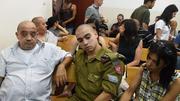
A day after Sgt. Elor Azaria provided his first version of events surrounding the shooting of a neutralized terrorist, defendant maintains main line of defense: 'Try explaining to a mother whose son was killed because he didn’t shoot because he only suspected.'
The cross examination of Sgt. Elor Azaria got underway on Monday morning after he told the military court the preceding day that he shot dead a wounded terrorist in Hebron because he sensed “clear and present danger."
Azaria opened by stating that paramedic A., who testified against him along with other witnesses, had forgotten to include certain things which were key to the case.
After being pressed by prosecutor Lt. Col. Nadav Weisman and asked whether all the witnesses were lying, Azaria said that not all but that Company Commander Maj. Tom Na'aman “was a lying witness. Many of the things said by the battalion commander (Lt. Col. David Shapira),” he continued, “do not illustrate everything. He forgot to say a few things. I cannot say that the battalion commander is a liar but on a few points he lied.”
“I don’t want to be like a parrot but I have no choice. I don’t fully remember the testimony of the brigade commander. Show me it and I will respond to your question about whether he lied or not,” Azaria told Weisman before reiterating that “the company commander slapped me in the face and I am still undergoing psychological help.”
When asked to explain why he waited until last week to claim that the company commander had slapped him twice following the shooting, Azaria said, “During the investigation at the IDF's Criminal Investigation Division (CID), I didn’t remember a few things. I was still in shock from the incident. There was always something that made me want to finish the investigation as quickly as possible.”
The prosecution produced a video for the first time from the investigation room when Azaria was originally brought in for questioning in which he can be heard saying, “the company commander was not angry at me” - a statement which appeared to contradict his new testimony regarding the slap.
Azaria retorted, however, by saying, “My mental state was not good. I am not a psychologist” prompting the prosecutor to state: “Listen to me. You know very well (what I mean).”
Azaria then told the examiner, “It isn’t right that a soldier hits another soldier in the company.” When he accused him of avoiding the question, Azaria said, “I will continue to answer like a parrot. Things have emerged which strengthen my case.”
He went on to state that he was able to recollect his thoughts as he prepared his case with his lawyers. When Weisman demanded that Azaria provide names of witnesses who saw him being slapped in the face, he said that two or three people were standing nearby and saw the incident. I was in shock from the company commander’s response and from the whole incident. Anyone in the field can understand what I am talking about.”
The prosecution then called into question his claims about the slap stating that his cellphone correspondence on the day of the incident contained no mention whatsoever of such an occurrence and that he never informed anyone that he had been slapped. He concluded by saying, "you invented the slap claims."
"I was in shock that is why I never told the battalion commander about the slap,' Azaria said.
Azaria was asked about his behaviour next to his company commander which was captured on camera by B’Tselem, in light of his claims that he had just been slapped: “The clips mean nothing to me. They never did and they never will.”
The point was pressed by the prosecutor who told the defendant that the court could order him to address the clips since they are pieces of evidence in the case. After repeating his contempt for the clips, Azaria turned his focus onto B’Tselem: “The B’Tselem photographer claimed that they photograph infringements of human rights. I have never seen them document terror attacks.”
The prosecutor then showed Azaria a picture from the scene in which he can be seen smiling: “Is this how a soldier looks after he has been slapped by his company commander a few minutes before and who claims he is in shock?” asked Weisman. “Possibly,” Azaria said. He added that he never told his commanders about the slap because he didn't think to."
He also repeated the claims that “our commanders never trained us about what to do in the case of a bomb. We never asked about bombs because they only spoke to us about knives.”
He later sought to draw attention to the fact that the prosecutor had no experience of the situation in the field: “You have never been in this kind of situation so obviously you will not understand what it is to be in the field during an incident such as this where any moment you or your friend or a civilian can die. It is nice in here where there is air conditioning.”
“I am not offended by your personal comments,” the prosecutor responded, “even though they are not appropriate.”
“I see now that with there being an air conditioner here there is time to think when you are not exposed to danger but in the field it is a matter of fractions of seconds," Azaria said.
The president of Jaffa Military Court, Colonel Maya Heller then interjected, telling him: “It is time to finish this part and for you to answer the question which had been put to you four times: Were you surprised by the questions about your reactions in the field?”
“Of course we need to move away from this but it is totally different in the field when you don’t have a moment to think and you recognize the danger," he repeated.
When the hearing reconvened in the afternoon, discussions revolved around the rules of engagement and opening fire.
“If the terrorist is neutralized and doesn’t constitute danger there is no need to shoot him,” said Azaria. “Even forbidden to shoot him,” added the prosecutor. Azaria responded by emphasizing: “It is forbidden to shoot him if he doesn’t constitute a danger.”
“Based on the circumstances, if you have any reasonable suspicion that the terrorists has the means to carry out an attack, you don’t see it, but you know that you suspect it, then that is enough to neutralize him. Why? Because we are taught that if there is a suspicion then you don't wait,” he said.
The judge then took Azaria to task about this well-known military proverb. “Doesn’t this phrase not mean the opposite? That is to say, when there is a doubt you are not supposed to open fire in order to avoid mistakes.”
“I understand from this sentence,” Azaria replied, “that when there is a doubt, a fear that a terrorist (could strike) you neutralize him.”
Asked whether—with the knowledge of hindsight that the terrorist did not have a bomb on his body—he would have shot him, Azaria said, “I think that I acted as I was supposed to."
"With the suspicion that I had you don’t take the risk. He could blow himself up and you would feel guilty that you did nothing about it. How can you explain to the mother whose son was killed because he didn’t shoot because he only suspected.”
“If you had known at the time that he did not have an explosive under his clothes would you have shot him?”, he was asked to which he replied: “That is the whole point, ‘if.’ I don’t know. I had two concerns in mind, an explosive and a knife. If I had known that a check had been conducted I would not have shot him in the head.”
The prosecution put before Azaria the question, “Could it be that to this day you think that the terrorist needed to be shot because he deserved to die for trying to stab your friends?”
The point was dismissed by Azaria: “I didn’t shoot him because he stabbed my friend. I shot him because I sensed an immediate danger to people at the scene.”
“Can you confirm for me that the terrorist’s hand was not close to the knife?,” the Weisman continued.
“Only based on what is seen in the video. I saw it in real time. When I was there his hand was close to the knife.”
The cross examination of Sgt. Elor Azaria got underway on Monday morning after he told the military court the preceding day that he shot dead a wounded terrorist in Hebron because he sensed “clear and present danger."
Azaria opened by stating that paramedic A., who testified against him along with other witnesses, had forgotten to include certain things which were key to the case.
After being pressed by prosecutor Lt. Col. Nadav Weisman and asked whether all the witnesses were lying, Azaria said that not all but that Company Commander Maj. Tom Na'aman “was a lying witness. Many of the things said by the battalion commander (Lt. Col. David Shapira),” he continued, “do not illustrate everything. He forgot to say a few things. I cannot say that the battalion commander is a liar but on a few points he lied.”
“I don’t want to be like a parrot but I have no choice. I don’t fully remember the testimony of the brigade commander. Show me it and I will respond to your question about whether he lied or not,” Azaria told Weisman before reiterating that “the company commander slapped me in the face and I am still undergoing psychological help.”
When asked to explain why he waited until last week to claim that the company commander had slapped him twice following the shooting, Azaria said, “During the investigation at the IDF's Criminal Investigation Division (CID), I didn’t remember a few things. I was still in shock from the incident. There was always something that made me want to finish the investigation as quickly as possible.”
The prosecution produced a video for the first time from the investigation room when Azaria was originally brought in for questioning in which he can be heard saying, “the company commander was not angry at me” - a statement which appeared to contradict his new testimony regarding the slap.
Azaria retorted, however, by saying, “My mental state was not good. I am not a psychologist” prompting the prosecutor to state: “Listen to me. You know very well (what I mean).”
Azaria then told the examiner, “It isn’t right that a soldier hits another soldier in the company.” When he accused him of avoiding the question, Azaria said, “I will continue to answer like a parrot. Things have emerged which strengthen my case.”
He went on to state that he was able to recollect his thoughts as he prepared his case with his lawyers. When Weisman demanded that Azaria provide names of witnesses who saw him being slapped in the face, he said that two or three people were standing nearby and saw the incident. I was in shock from the company commander’s response and from the whole incident. Anyone in the field can understand what I am talking about.”
The prosecution then called into question his claims about the slap stating that his cellphone correspondence on the day of the incident contained no mention whatsoever of such an occurrence and that he never informed anyone that he had been slapped. He concluded by saying, "you invented the slap claims."
"I was in shock that is why I never told the battalion commander about the slap,' Azaria said.
Azaria was asked about his behaviour next to his company commander which was captured on camera by B’Tselem, in light of his claims that he had just been slapped: “The clips mean nothing to me. They never did and they never will.”
The point was pressed by the prosecutor who told the defendant that the court could order him to address the clips since they are pieces of evidence in the case. After repeating his contempt for the clips, Azaria turned his focus onto B’Tselem: “The B’Tselem photographer claimed that they photograph infringements of human rights. I have never seen them document terror attacks.”
The prosecutor then showed Azaria a picture from the scene in which he can be seen smiling: “Is this how a soldier looks after he has been slapped by his company commander a few minutes before and who claims he is in shock?” asked Weisman. “Possibly,” Azaria said. He added that he never told his commanders about the slap because he didn't think to."
He also repeated the claims that “our commanders never trained us about what to do in the case of a bomb. We never asked about bombs because they only spoke to us about knives.”
He later sought to draw attention to the fact that the prosecutor had no experience of the situation in the field: “You have never been in this kind of situation so obviously you will not understand what it is to be in the field during an incident such as this where any moment you or your friend or a civilian can die. It is nice in here where there is air conditioning.”
“I am not offended by your personal comments,” the prosecutor responded, “even though they are not appropriate.”
“I see now that with there being an air conditioner here there is time to think when you are not exposed to danger but in the field it is a matter of fractions of seconds," Azaria said.
The president of Jaffa Military Court, Colonel Maya Heller then interjected, telling him: “It is time to finish this part and for you to answer the question which had been put to you four times: Were you surprised by the questions about your reactions in the field?”
“Of course we need to move away from this but it is totally different in the field when you don’t have a moment to think and you recognize the danger," he repeated.
When the hearing reconvened in the afternoon, discussions revolved around the rules of engagement and opening fire.
“If the terrorist is neutralized and doesn’t constitute danger there is no need to shoot him,” said Azaria. “Even forbidden to shoot him,” added the prosecutor. Azaria responded by emphasizing: “It is forbidden to shoot him if he doesn’t constitute a danger.”
“Based on the circumstances, if you have any reasonable suspicion that the terrorists has the means to carry out an attack, you don’t see it, but you know that you suspect it, then that is enough to neutralize him. Why? Because we are taught that if there is a suspicion then you don't wait,” he said.
The judge then took Azaria to task about this well-known military proverb. “Doesn’t this phrase not mean the opposite? That is to say, when there is a doubt you are not supposed to open fire in order to avoid mistakes.”
“I understand from this sentence,” Azaria replied, “that when there is a doubt, a fear that a terrorist (could strike) you neutralize him.”
Asked whether—with the knowledge of hindsight that the terrorist did not have a bomb on his body—he would have shot him, Azaria said, “I think that I acted as I was supposed to."
"With the suspicion that I had you don’t take the risk. He could blow himself up and you would feel guilty that you did nothing about it. How can you explain to the mother whose son was killed because he didn’t shoot because he only suspected.”
“If you had known at the time that he did not have an explosive under his clothes would you have shot him?”, he was asked to which he replied: “That is the whole point, ‘if.’ I don’t know. I had two concerns in mind, an explosive and a knife. If I had known that a check had been conducted I would not have shot him in the head.”
The prosecution put before Azaria the question, “Could it be that to this day you think that the terrorist needed to be shot because he deserved to die for trying to stab your friends?”
The point was dismissed by Azaria: “I didn’t shoot him because he stabbed my friend. I shot him because I sensed an immediate danger to people at the scene.”
“Can you confirm for me that the terrorist’s hand was not close to the knife?,” the Weisman continued.
“Only based on what is seen in the video. I saw it in real time. When I was there his hand was close to the knife.”
